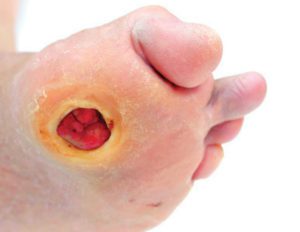Michael J. Petrocelli, D.P.M., F.A.C.F.A.S., C.W.S.P.
Board Certified Ankle and Foot Surgeon and Board Certified Wound Care Specialist
 Podiatrists focus on the feet and everything associated with the foot and ankle, such as the tendons, muscles, ligaments, and bones.
Podiatrists focus on the feet and everything associated with the foot and ankle, such as the tendons, muscles, ligaments, and bones.
Podiatric specialists regularly treat anything that makes up the structure, function, and health of the entire foot. In the state of Florida, a podiatrist is not only able to medically treat the foot, but they also treat the lower extremity. Because the knee is in such close relation to the effects of the foot and ankle, podiatrists regularly treat bone and soft tissue disorders from the knee down. With Diabetes, the leg, foot and ankle are often affected by wounds that do not heal!
Diabetic Wound Issues:
Diabetes is a complicated condition to gain control of, but one of the most painful parts of this disease is the development of diabetic wounds. Often these wounds become “non-healing” due to the adverse effects of the systemic disorder.
Millions of people with diabetes will suffer from diabetic foot ulcers more than once in their lifetimes. Diabetes is a progressive disease that is many times, not taken seriously enough by people predisposed to the disorder.
High blood sugar damages various organs within the body, but also has a severely adverse effect on nerves. This nerve damage happens when the blood supply is limited. The small blood vessels, which supply blood and nutrients to the nerves becomes impaired. When the nerves are no longer fed nutrients, they either die, or their signals to the brain are ineffective. The lack of brain signaling from the nerve endings makes it difficult for a person to feel pain in their foot, so often injuries and these disorders are overlooked. This syndrome is called peripheral diabetic neuropathy.
Because of this nerve damage, people with diabetes are at a higher risk of developing foot ulcers. A foot wound may not sound overly alarming to most people, but foot ulcers can be life-threatening.
These small sores go undetected due to the lack of feeling. If a patient delays treatment, foot ulcers can lead to amputation, strokes, heart attacks and severe infections that can spread throughout the entire body.
At Collier Podiatry, make it a priority to provide advanced diabetic wound services. Collier Podiatry, P.A., is the practice of Dr. Petrocelli, a board-certified podiatrist who has been practicing since 1994. With over 20 years of experience, Dr. Petrocelli provides next-level care for diabetic patients with wounds and ulcers. He is board certified in wound healing and can treat any wound below the knee.
Diabetic Wounds & Vascularization
If you have ulcers and lacerations that never fully heal, you might have a chronic wound. These are most often caused by diabetes mellitus, which causes blood vessels in the feet and hands to grow smaller. The restriction of blood flow damages nerve areas and reduces sensation.
Chronic wounds can also be caused by venous stasis, a condition of the veins in the lower legs, which also deprives your feet of adequate blood flow. With both conditions, when you bump or cut your foot or when you develop an ulcer, the lack of blood flow makes it difficult for the wound to heal.
In the endothelial layer of the dermis, vascularization must take place in order to heal the wound. The neovascularization or also known as angiogenesis is when new microvessels, fibroblast, and collagen begin to proliferate and form along with an increase in oxygen uptake and micronutrients to help grow new tissue, and to build a strong vascular blood flow to supply the proper nutrients to the dermal layers.
Along with Collier Podiatry’s advanced wound healing protocols, Dr. Petrocelli often works directly with vascular surgeons to find ways to restore blood flow to the affected area so that the wound can finally heal.
Collier Podiatry maps out your treatment plan by taking a meticulous culture of your chronic wound, which assists them in deciphering and implementing the best strategy for your diabetic wound care and prescribing the correct medications for your particular case. Collier Podiatry does all of this with the goal of ridding you of your painful chronic wounds once and for all.
Collier Podiatry’s Wound Care Treatment:
. Antibiotics
. Grafts
. Hyperbaric oxygen treatments
. Saline debridement
. Surgery
. Therapeutic footwear
. Wound care
. Vascular Treatment
People with diabetes are encouraged to do self-checks on their feet daily. As soon as you notice any redness or wounds, it is imperative to see your podiatrist.
Collier Podiatry, P.A.
Michael J. Petrocelli
D.P.M., F.A.C.F.A.S., C.W.S.P.
239-775-0019
www.collierpodiatry.com
NCH Countryside Commons
1715 Heritage Trail, Suite 204
Naples, FL 34112
Phone: (239) 775-0019
Fax: (239) 775-0219









